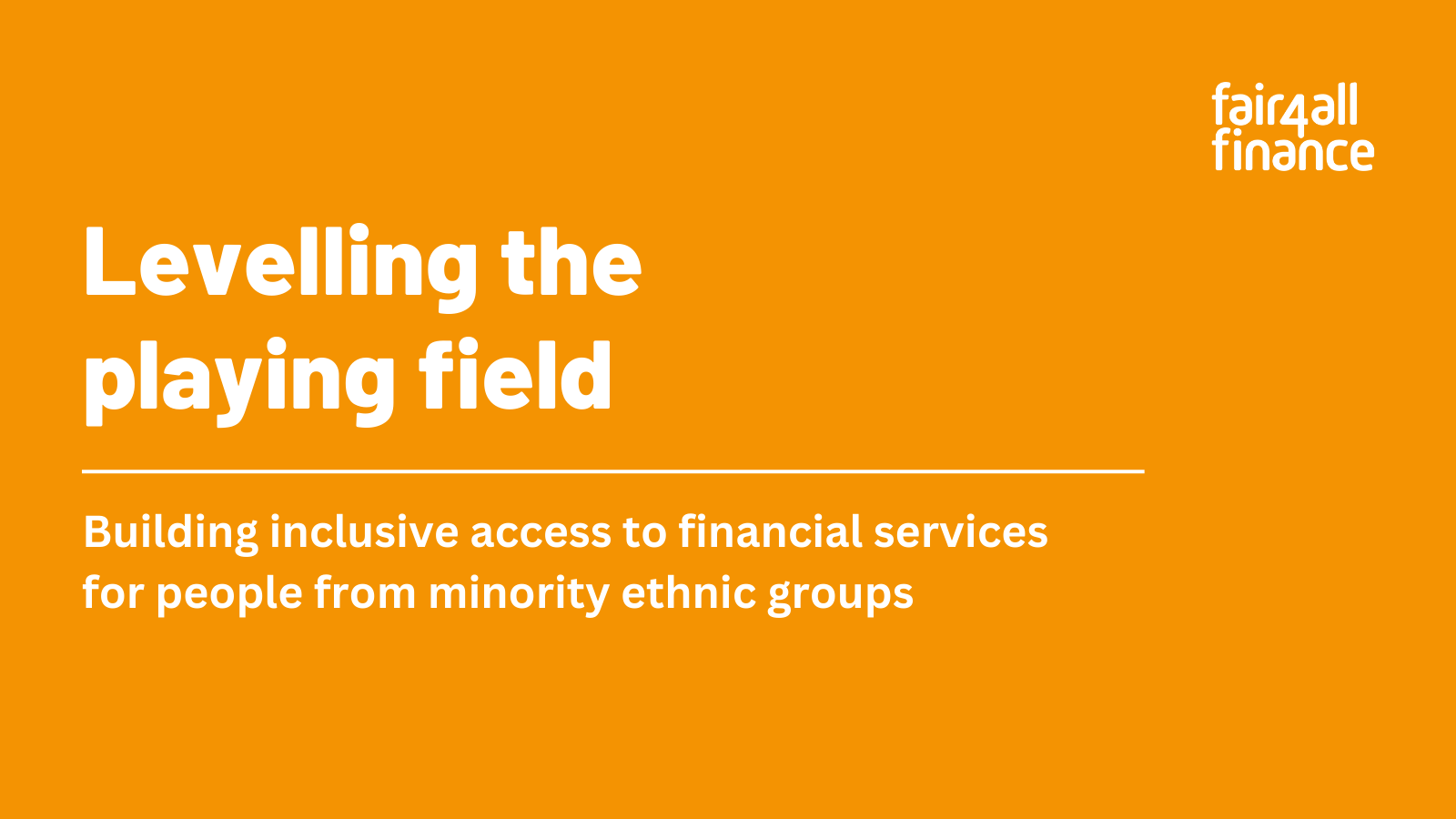1 in 5 people from minority ethnic groups experience discrimination due to race when dealing with financial providers finds new report
Our new research finds people from minority ethnic groups experience discrimination and multiple barriers to accessing financial services in the UK
The goal with this research is to improve the understanding of the financial lives and needs of people from minority ethnic groups. We believe that we can help transform the financial system through investment, research, and partnerships – so that everyone has access to the right products and services, whenever they need them.
The report finds:
- People from minority ethnic groups face greater exclusion from the financial system right now
- People from minority ethnic groups experience higher levels of discrimination and face multiple barriers to accessing mainstream finance
- It doesn’t have to be like this – there are clear solutions and practical ways to address discrimination and improve financial wellbeing
- This is an opportunity for the UK financial service providers to accelerate work on improving financial inclusion
Our new report into how ethnicity influences access to financial services in the UK finds that people from minority ethnic groups experienced higher levels of discrimination and face multiple barriers to accessing mainstream finance, including a lack of trust, ‘one size fits all’ solution, a lack of transparency around decision making, and a lack of cultural representation.
Our ‘Levelling the playing field’ report also finds that people from minority ethnic groups hold fewer financial products that help build resilience, experience more life events, and are less likely to have positive interactions with banks.
‘The findings from this research are stark – right now people from minority ethnic groups in the UK face greater exclusion from the financial services system. It’s clear that change is needed, and it’s needed now. Our Calls to Action and practitioner group provide an opportunity for the UK banking sector and other financial service providers to accelerate their work on improving financial inclusion and ensure the needs of all communities are met.
‘We’re grateful to all of the organisations and individuals who supported and contributed to this research. We hope the findings will inspire everyone working in the sector to take further steps towards greater equity and inclusion.’
Sacha Romanovitch OBE, CEO of Fair4All Finance
The research we commissioned was undertaken by IPSOS and found that 22% of those from minority ethnic groups have experienced discrimination due to race when dealing with financial providers, with qualitative research from ClearView Research hearing lived experiences of people from these groups being treated with overt suspicion, we also heard about people being accused of lying. Those more likely to be financially disadvantaged were more likely to experience discrimination.
The research also found that:
- 45% of people from minority ethnic groups have looked for help from a financial provider on a topic such as setting up an account, or transferring money, compared to 25% of white people
- 45% of white people had a ‘very positive’ experience after seeking help, that number dropped to 29% among people from minority ethnic groups
These findings are true across age groups, and for both respondents born outside and inside the UK. In many cases, people’s experiences were worse when English was not their first language.
We’ve also convened a practitioner group, including some of the UK’s largest banks and building societies, which will collaborate to turn recommendations from the report into actionable solutions.
We’re incredibly grateful to all the individuals and organisations who took part in this research and gave us a rich data set and compelling human stories about their experiences of financial services in the UK. We’re also thankful to our Steering Committee who supported the development of this research, and our Practitioner Group who supported the validation of our findings and the construction of our Calls to Action.
Our calls to action
1. Be inclusive in design
Financial services providers need to bake inclusivity into their processes, policies and products. This will ensure that these meet people’s needs and do not discriminate in any way because of ethnicity.
This is not optional. Firms have existing legal requirements under the Equality Act 2010, or equivalent legislation, to avoid direct and indirect discrimination. Under the Consumer Duty requirements, firms are expected to ‘carry out monitoring to identify where distinct groups of customers…who share protected characteristics get worse outcomes than other customers. The Consumer Duty requirements expect ‘firms to have processes in place to investigate the cause(s) and addresses any problems’. Firms are expected to monitor, identify, and act.
We call on financial services providers to:
- Understand and address how experiences and perceptions of discrimination impact customer journeys
- Ensure harder to reach voices are heard in product development, testing and distribution and there is no unconscious bias
- Make assessments on how representative the customer base is compared to the population of the country or local community, and use this to set targets to improve access
- Listen to and understand individuals’ needs, instead of a ‘one size fits all’ approach
- Provide culturally relevant training for all customer facing staff
- Be culturally sensitive to, but not presumptuous about, people’s needs and preferences, eg although Sharia-compliant products cater for those of Muslim faith, do not assume that someone who is Muslim will definitely want Sharia-compliant products
- Ensure communications and branding are inclusive of different minority ethnic groups
- Guides looking at how inclusive design can be embedded into product design are a good reference point. Inclusive Design in Financial Services: A practical guide for firms and suppliers by Fair By Design and Money Advice Trust provides practical steps from the start of the design process through to launching the end product for firms working in the credit, energy and insurance sectors.
2. Be transparent in decision making
This is essential to improving access to services and building financial resilience. It will also help build trust with financial services providers.
It also requires financial services providers and credit reference agencies who provide credit files to work together to be more transparent. We recognise that lenders’ individual risk models are proprietary and tailored to their specific needs but there needs to be a sector-wide commitment to eliminate bias in decision making.
We call on financial services providers to:
- Work together to identify robust steps to eliminate bias in decision making
- Be more transparent and clearer to people on how decisions on applications for products are made, why they were rejected and what their pathway is to improve future applications
- Help people understand what they need to do to improve their credit scores
- Work with credit reference agencies and minority ethnic groups to understand how additional financial behaviours can be used as indicators of repayment reliability. (Some examples of good financial behaviour, which are often more associated with people from minority ethnic groups, are not currently being used)
3. Break down barriers
Financial services providers need to make it easier, both for existing customers and people who do not bank with them to access their products. There is a legacy of poor experiences to overcome with people from minority ethnic groups.
We call on financial services providers to:
- Measure the type of products that minority ethnic groups are using and develop pathways to move towards products that better support financial resilience eg basic bank account to current account
- Simplify processes for opening accounts and accessing products
- Accept non-standard forms of identification, publicise the different forms of documentation which are acceptable, and work with trusted partners and organisations that work with people from minority ethnic backgrounds to facilitate this
- Use clear vocabulary – jargon is a problem for all customer groups. Use processes to identify language that people don’t understand and effective ways to demystify financial products
- Make information more accessible by focusing more on benefits than features – eg ‘buy a house’ rather than ‘a mortgage’
- Translate information into different languages that are easily accessible and facilitate different language options across different channels. This should go beyond workshops and financial education and extend to different channel communications and legal paperwork. For instance, give people the option to switch language in financial apps
- Test customer experience journeys with different minority ethnic groups to understand pain points and barriers, and potential solutions to these
- While technology can help improve access to financial products, financial services providers must also meet the needs of people from minority ethnic groups who do not bank digitally, particularly those who do not live near a local branch
4. Improve cultural representation
Minority ethnic groups should be fairly represented within financial services organisations. There is both a business case and a moral case for this. Diverse voices, experiences and thinking will help financial services providers better serve all their customers.
We call on financial services providers to:
- Increase representation of minority ethnic groups at all levels. We know many organisations will have ethnicity targets at board and senior leadership level, but this needs to extend through the entire business eg customer facing roles
- Review recruitment practices and people policies to eliminate potential bias and discrimination
- Report on pay by ethnicity
5. Engage with communities
Financial services providers should work with communities to improve access to products and financial understanding. This will also help build trust.
We call on financial services providers to:
- Work with culturally trusted figures. We heard from our Lived Experience Group that there should be ‘Martin Lewis equivalents’ that can speak to a range of people from minority ethnic groups. Financial institutions can support the delivery and scaling up of this
- Have lived experience at the heart of inclusive design to shape new and existing propositions. Financial institutions should explore how they use the Voluntary, Community & Social Enterprise (VCSE) sector to do this
- Learn from informal community savings circles to understand what factors matter to people
- Partner with grassroots organisations to create pathways to improve people’s access and take up of financial products. An example is providing help in opening bank accounts
- Bridge the gap between branch/bank presence. Use trusted community spaces like schools and local community organisations to build trust and improve access
6. Strengthen financial resilience
People from minority ethnic groups suffer systematic economic disadvantages. Financial services providers, alongside civil society and minority led group organisations, have a role to play in tackling this. Wrap around activities, alongside core business offerings, will allow for improved financial resilience and better outcomes for customers.
We call on financial services providers to:
- Explore the interplay between debt vulnerability and discrimination. Financial service providers and support organisations should explore what help they can provide for minority ethnic groups to address and overcome problem debt. This could include forbearance methods and how they are applied, cultural understanding of financial commitments, current debt recovery and default processes to support overcoming problem debt
- Support and resource community groups which help build financial literacy and resilience. Fund scale ups where appropriate
- Work with a range of financial education partners, minority led groups and civil society to improve the reach of existing educational programmes
- Build knowledge and capability among people from minority ethnic groups using methods such as online courses and in-person workshops – these could cover subjects such as how to migrate from a basic bank account, ways to improve your credit score, and how to build long-term financial security
Provide programmes specifically for young people from minority ethnic groups – to start them on the right financial path, but also so that they can share this knowledge with their families and friends accurately and comprehensively
7. Regulate for financial inclusion
Improving financial inclusion is not a job for banks alone. There are many things that financial services providers can do right now to improve financial inclusion for people from minority ethnic backgrounds. There is also an important role for the regulator to provide leadership, support and a framework for firms to tackle this issue. By building on its existing workstreams on Diversity and Inclusion and the Consumer Duty and applying an ‘ethnicity lens’ across its work, the FCA can continue to drive better outcomes for customers from minority ethnic groups. We call on the FCA to:
- Build on its important work to improve diversity and inclusion in financial services, which has focused on representation among staff and internal processes. This should include diversity and representation at all levels of the business, including customer facing staff and those involved in design and propositions. We encourage firms and the FCA to consider how improving customer outcomes can support improving diversity and inclusion in hiring talent
- Investigate the exclusion of customers from minority ethnic groups, including looking at reported discrimination and bias, in order to improve diversity and inclusion within firms’ customer groups. The Regulators Guide to support inclusive design in essential services by Fair by Design and Money Advice Trust explores how inclusive design can help regulators achieve their objectives
- Through the ongoing Credit Information Market Study, seek to improve how credit reporting works for people from minority ethnic groups. Market remedies should aim to make credit information clearer and more accessible to consumers, and to ensure that firms are transparent about why credit decisions have been taken. Proposed remedies to improve data quality and granularity of credit reporting should be designed to support access to financial services among excluded groups
- Explore the findings and recommendations of the Financial Services Consumer Panel which finds evidence that suggests consumers with protected characteristics, including ethnicity, are experiencing bias due to how personal data and algorithms are used
- Further use the Consumer Duty to improve outcomes for people from minority ethnic groups. Under the Consumer Duty, firms will be expected to account for different outcomes experienced by different customer groups. The FCA can use this to drive better outcomes for people from minority ethnic groups. We encourage firms to apply an ‘ethnicity lens’ to all elements of their customer journey and Consumer Duty rules and ask the FCA to support the financial services sector as they develop approaches to improve outcomes for minority ethnic customers.
Next Steps
If you would like to find out more, or get involved with our practitioner group, please get in touch with Ayesha at ayesha@fair4allfinance.org.uk






